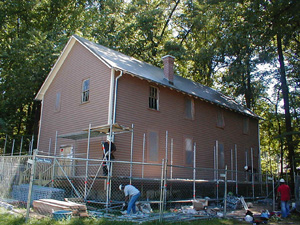 Sandy Spring Odd Fellows Lodge in Sandy Spring, Montgomery County.
Sandy Spring Odd Fellows Lodge in Sandy Spring, Montgomery County.
The African American Heritage Preservation Program (AAHPP) provides grants to assist in the preservation
of buildings, sites, or communities of historical and cultural importance to the African American
experience in Maryland. The AAHPP is administered as a partnership between the Maryland Historical
Trust and the Maryland Commission on
African American History and Culture (MCAAHC). The program typically
receives an annual appropriation of $5,000,000 for grants per year. Applications for the AAHPP are typically
available in early April and due July 1, with decisions made by December every year.
Eligible Applicants
The AAHPP provides capital grants to nonprofits (state and federal government entities may apply as
nonprofits), local governments, businesses and individuals for eligible projects.
Eligible Projects
All projects must be related to African American history, culture, or heritage in Maryland. Applicants
may apply for grants of up to $250,000 for the following types of projects:
- Acquisition
- Rehabilitation / capital improvements
- New construction
- Predevelopment costs such as studies, surveys, plans and specifications, and architectural, engineering,
or other special services directly related to pre-construction work for a capital project
Work, or a discrete phase of work, that is already underway or completed is not eligible for grant funding.
A complete list of eligible and ineligible costs is available in the Grant Guidelines.
Projects are subject to MHT review and must comply with the Secretary of the Interior's
Standards for Treatment of Historic Properties (26 CFR 68).
Eligible Properties
To be eligible for funding, either the property itself or the proposed use must have associations with
African American heritage. Property use must also provide a strong public benefit to be competitive. In
addition, special qualifying criteria are outlined below.
- Grants for religious properties can generally only fund structural or exterior work and cannot fund
work on interior worship spaces or elements bearing religious imagery. Eligibility is reviewed on
a case-by-case basis.
- Cemeteries may be eligible for assistance; the applicant must demonstrate clear
property ownership.
The permission of the property owner to undertake the project must be secured in writing and provided
as part of the grant application.
If the assisted property is individually listed in or eligible for listing in the National Register, a
term preservation easement on the assisted property must be conveyed to MHT (for more information,
visit the Easements page).
Other Requirements
Additional information regarding evaluation criteria and grantees’ responsibilities, including competitive
procurement of services, MHT approval of proposed work, reporting, etc. is provided in the
Grant Guidelines
and Grants Manual.
For general information about the African American Heritage Preservation Program or to check the status of
your project, contact Stacy Montgomery, Capital Programs Administrator,
stacy.montgomery@maryland.gov or (410) 697-9559.